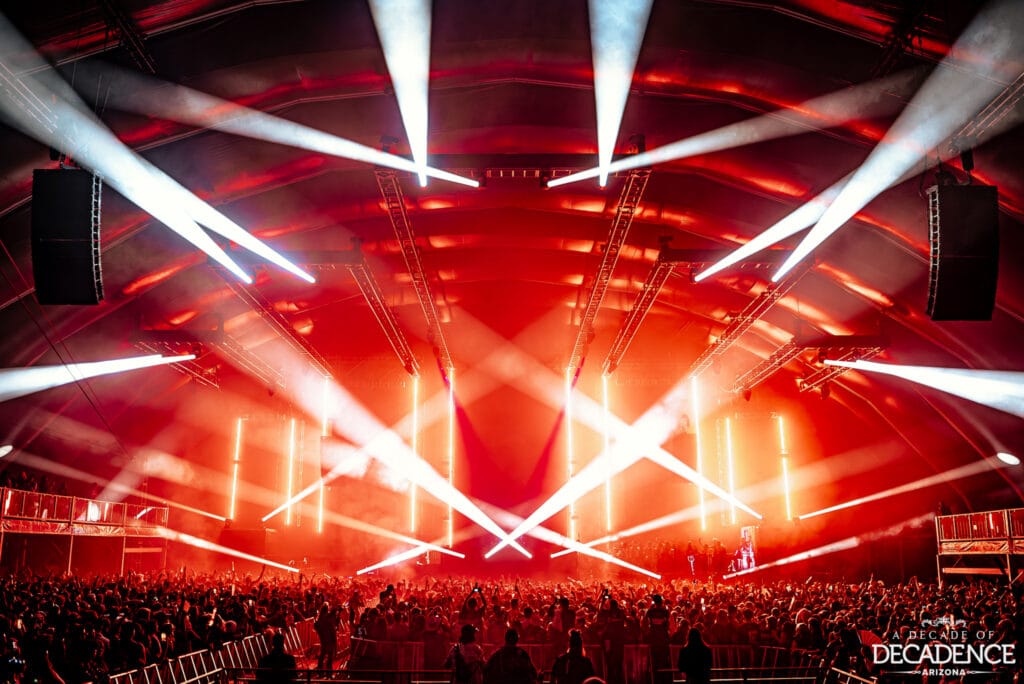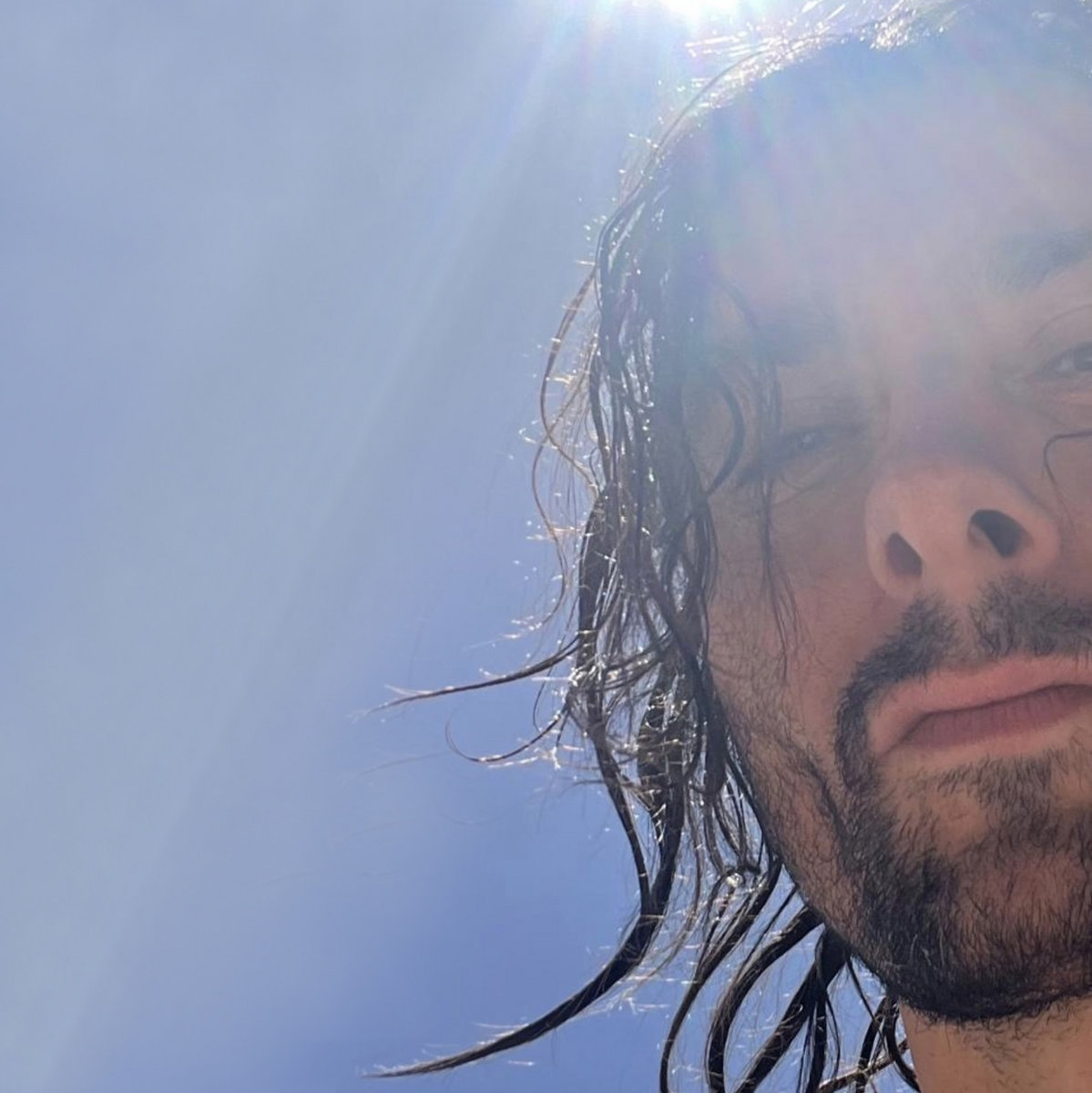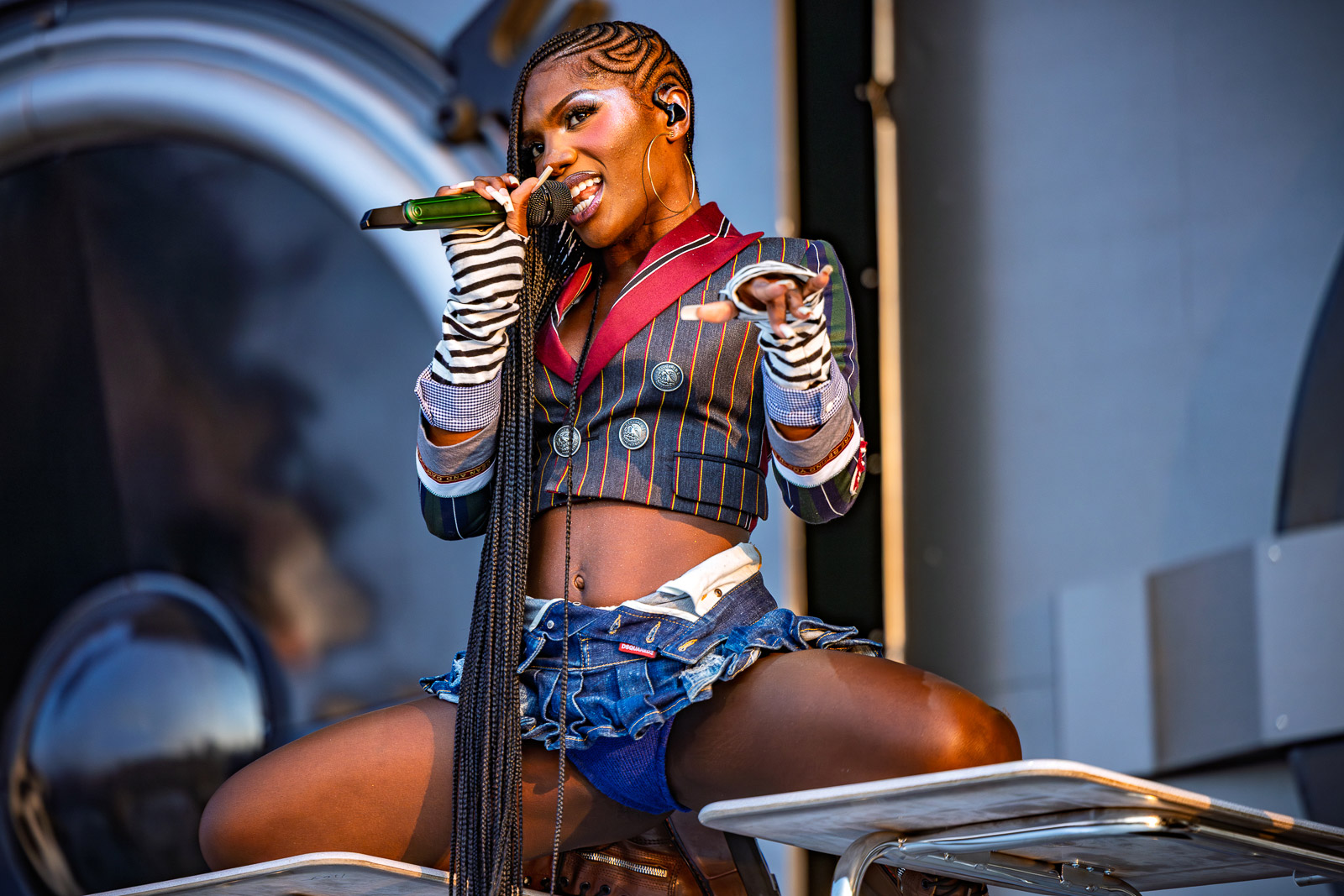

Lead photo by Jackson Wooten
It took until album number five for Bob Dylan to controversially go electric, as outraged fans branded him Judas and slung rotten fruit. Lila Tristram made a similar jump – from “long-haired folky folk girl working at the Green Note” to the commander of a formidable rock ensemble – while making her debut album. The difference being, everyone’s on side.
Until recently, Tristram thought of herself as a kind of lone-wolf wanderluster, tinkering in solitude with hushed, swaddling songs after her housemates had gone to sleep. Take her EP Home from 2023, whose delicate, chest-aching little acoustic capsules are concerned with subtle feelings and nature’s osmosis, so quiet they wouldn’t wake a mouse, let alone a housemate. She wrote, sang, played, recorded, and mixed the entire thing by herself. But for her debut full-length album, titled America, the songs demanded more – more instruments and people, more textures and ideas. “They make the rules,” she says, and isn’t kidding.
That’s how Tristram wound up on Denmark Street with a wad of cash like in a scene from a biopic. London’s historic hub for musical instrument stores, music publishing companies, and long-dead music magazines, Tin Pan Alley remains the place to be if you need to bring home an electric guitar. It’s also the place to be if you need to recruit band members, apparently, as Tristram discovered while in Wunjo Guitars. The shop assistant steering her through the unfamiliar electric world, Annie Needham, ended up becoming her new best friend, housemate, and then her co-conspirator in Mary Magdalene – a “witchy duo” side project that needs its own separate article.
Tristram has a way of making friends wherever she goes – she mentions several examples during our chat – and it’s a handy skill to have when it comes to assembling a crack team of talented, one-of-a-kind musicians with which to electrify your songs. Welsh-born, Yorkshire-based Ailsa Tully releases flawless solo work that showcases her incredible, solicitous voice and singular approach to using field recordings. She’s also a classically trained cellist-turned-bassist, and on America, her lyrical but unshowy bass lines carefully thread together Tristram’s diffuse, all-seasons folk rock.
Get the Best Fit take on the week in music direct to your inbox every Friday
Then there’s drummer Heledd Owen: she’s behind the kit for Ailsa Tully as well, and her style is a spot-on combination of restraint yet resolve – beautifully dynamic. Jack Handyside is another where-did-you-find-this-guy type of brilliant mind. “He’s just written a book on his own guitar method for transcribing Baroque music,” Tristram scoffs in admiration. “He is operating from a different dimension, that man, and even watching his fingers move around the fretboard, I actually can’t believe my eyes.” Last but not least, Tim Gardner widens the scope with synth, violin, and soundscape textures – “this sprinkle of magic on everything.” When they come together on America, the result might remind you of a Laurel Canyon–located jam session with intention, involving Nick Drake, Joni Mitchell, and Dylan in his Strat era.
It’s apt to introduce each band member here because America (and Tristram’s life more broadly) is defined by the people: her community of fellow musical anachronists. For instance, it’s significant that the final word on her debut album goes not to Tristram herself, not to her voice or even a voice. Instead to what we might call instrumental giggles: a band’s candid, atonal fizzling out that’s usually confined to the rehearsal room – goofy bum notes, the smack of strings and clatter of drumsticks, the sound of a unit in the process of becoming unlocked after a symbiotic session. The opposite of plugging in and tuning up (though how many times have we heard the obligatory jack-lead-meets-amp crackle, and how seldom do we hear this kinda thing?).
“Oh my God, that was so emotional – we ended up completely getting lost in it,” Tristram says of the moment in the studio that the outro to “Hallelujah”, the final track, came together. “After you’ve been playing solo your whole life, [you realise] that when other people start performing your songs, the songs do take on a life of their own. They’re no longer yours.” As she wrote in “America: A Personal Reflection” – the essay included with her new album – “One time in the studio, I forgot my line during a take, stopped, and burst into tears. Really deep ones, the kind you have as a small child. And I realised in that moment I wasn’t crying because I’d made a mistake, I was crying because even after I’d stopped playing, the band kept going, and kept my music alive.”
 Photo by Daniel Glenn Padgett
Photo by Daniel Glenn Padgett
“Hallelujah” is the album’s major-key burst of sunlight, its vamping, elating coda providing a similar release as the one from “Hey Jude” – wordless group vocals and all. “It’s funny when you’re designing the layout of an album, you’ve got these things in the back of your mind, like, ‘Ah, no one’s gonna listen to the last songs,’ because everyone always drops off and the last songs on the record always have the fewest plays,” Tristram laments. “But I think ‘Hallelujah’ is one of my best pieces of work I’ve done, and I don’t really care if no one listens to it – just you and me.”
Elaborating on her feelings towards the album as a format, she concedes, “I know we’re in a culture of quite short, snappy [content] – even shorter than three minutes now, like, ‘What can you do in 30 seconds?’ That’s powerful, and I think that’s valid, but also, there’s really only so much impact you can have in one song. When you’ve got 45 minutes to play with, you can really change the atmosphere of a room, or change someone’s emotions, or change someone’s mind about something, or shape an experience in such a different way. I think it is such an important art form.”
Though these songs were workshopped over several years and spawned from different places and times in Tristram’s life, thematically, they are united under the illusory idea of “America.” Not so much the literal country – because, for one thing, GOP, there isn’t a country called “America” – but rather the open-ended connotations carried by the word, its corresponding blue-sky ideas, which still endure even after all the times the US has let everyone down. For many of us fascinated from afar, America is an abstract feeling we’ve cultivated inadvertently through years of cultural absorption – whether it’s the Beats or The Simpsons – this hope and possibility as endless as its sunbaked desert roads, as bottomless as its craggly canyons.
The opening track, “America”, plants the first seed of this concept: “I’ve always had a dream about America” goes Tristram’s matter-of-fact coo, the uncertain 7th chords and faint, rippling-water synthesisers pondering her admission. Later, it’s “Strawberries”, the penultimate track, that draws this narrative up to its epiphany summit: America never was the answer. “This city takes pity on nobody / Crooked are the branches of our memory,” she sings over this blistered, dusty dirge that spreads outwards and is reminiscent of Nick Drake’s Pink Moon – the collapsed, detuned acoustic playing and military snare; that blurry-old-photograph, lore-in-progress feel pervading it. “Your country is a fixture of my fantasy,” Tristram murmurs, as if whispering the words right into America’s ear. “Will I become one?” she asks – but whether she means fixture or fantasy is left to the listener.
Get the Best Fit take on the week in music direct to your inbox every Friday
“The fact that it’s becoming more and more apparent that it’s an illusion almost makes the title more poignant – for me, at least,” Tristram shares. “It’s this fantasy.” Indeed, these aren’t songs written post–America; they’re pre–America. “I had already written and recorded America before going there. I had been to visit as a child – I was like nine, I don’t really have coherent memories – but I’d written and recorded the album and only then went and spent some time there. It was quite different from what I had imagined.”
Full disclosure: she went to further a fledgling, eventually aborted romance with a Californian she refers to with her tongue in her cheek as “the man” or “the cowboy.” The man had a lot to do with America the album’s inciting incident, though it quickly outgrew his influence. The two spent time together in New York, but naturally, she ended up in Music City. “Nashville is a funny old place,” she says. “My experience of Nashville was that it was kind of like Disneyland for country music. Like, everywhere you went, it was about country music. Every single bar you went into, every taxi you got into, every cafe, it was country music. There was a street where there were literally speakers like a street lamp, but it was speakers blasting out country music. Every. Single. Corner. I think, honestly, after a couple of hours, I was getting ear fatigue.”
This anecdote provokes a similar point as “Strawberries”: this almost parodic, contradictory, Disneyland reality only entrenches the idea that the “America” fantasy is just that – more powerful in your own mind. Instead, America becomes a conduit or catalyst for understanding yourself – perhaps the reality can never be as satisfying as that.
While writing the album, Tristram also looked to the US for its beacons of counterculture throughout history, wondering where art today fits in among the trailblazing examples that have done so much to shape our culture. This was prompted by a friend lending her Patti Smith’s Just Kids. Tristram was particularly moved by the portion in which Smith recounts her time living with Robert Mapplethorpe at New York’s lauded Chelsea Hotel – “this hotel is just like a home for all of these wandering, struggling artists,” she explains.
Famously, the landlord, Stanley Bard, was sympathetic to the plight of destitute creatives and let out airy, characterful, high-ceilinged suites for near enough peppercorn rents, enabling the likes of Jack Kerouac, Mark Twain, Bob Dylan, Janis Joplin, and Leonard Cohen to live in harmony in the Victorian Gothic accidental artists’ oasis.
“I was getting quite angry and thinking, where is the Chelsea Hotel of the 2020s?” Tristram continues. “I can’t think of a place in the world where, if you go and you hang out there long enough, and you dedicate yourself to your work long enough, and you meet the right people, you’ll get whisked into this community, into this world. Is it like Instagram or TikTok or something? Where is this physical place today?”
She answers herself: “But I think we’ve kind of created one.”
She means the community of artists oriented around a recording studio called The Barn. It’s located in a small Wiltshire hamlet – only an hour on the train from Waterloo, 20 minutes from Salisbury, but otherwise sequestered in the middle of nowhere. While recording at The Barn with America producer Gus White, Tristram was invited to live in a friend’s house, just five minutes down the road. “I remember Sam offering me this room, and I was like, ‘Umm, why would I move to Wiltshire? The middle of nowhere, nothing to do.’ I was working in London and I had my friends and my band. Then I went and there was some big party going on, and I stayed there for a few days, and I remember waking up one morning in his house and just thinking, ‘What am I doing? Obviously, I have to be here.’”
 Photo by Daniel Glenn Padgett
Photo by Daniel Glenn Padgett
“I can’t even find the words to express how much stuff is being created,” she continues in disbelief. “I’m just waiting for this community to be discovered. Gus is there, and his partner is an absolutely amazing painter. We’ve got a writer down the road, and we do these folk nights in the local pubs, and we’re kind of growing this community of locals who love art, and there’s an amazing sculptor who has a studio” – she’s only just keeping up with herself, itching to share the wonder of this place.
Speaking of those folk nights, she explains, “We all meet up every month or a few times a month to sing together. And it sounds so ridiculous, but my dad came to one of our folk nights and he was like, ‘Lila, you all look like you stepped out of the seventies, and I mean this from my memory – even the haircuts haven’t changed.’”
This isn’t Chelsea Hotel–esque nostalgia cosplaying, though. There’s substance – genuine, brilliant art – behind the haircuts and kaftans. Tristram can’t overstate the importance of having a physical space for artists to get together, share ideas, inspire and encourage each other: the Barn, the folk nights, gigs, even our interview – in a curious little park near Waterloo Station with rusty spider sculptures and an old man feeding the pigeons. In-person connection is part of why she founded the Artist Roadmap Programme and runs retreats for aspiring songwriters, recently having returned from one in Scotland.
“I care so much about art,” she effuses. “I believe in the healing power of art and the transformative power of art, as a creator and as an audience member. And it breaks my heart to see so, so much great art go unmade, and I can see it so much in so many people I know. I just want to do everything I can to make sure that [art is] facilitated, shared, and properly shared – with proper resources, not just made and then chucked in the attic to rot.”
 Photo by Daniel Glenn Padgett
Photo by Daniel Glenn Padgett
A tried-and-tested part of this is, of course, playing live – meeting people, sharing your work, inspiring and being inspired. After the Home EP was picked up by a small DIY CD label, Woodland Recordings, Tristram was invited to do a solo headline tour across the south of Germany, near the label’s Stuttgart HQ. Woodland’s head, Julia Laura, Tristram describes as “just an absolutely iconic, legendary, amazing woman. She just messaged me being like, ‘Can I book you a tour around Germany, please? I will put you up. I’ll make sure you’ve got somewhere to sleep every night. I will book all the venues. I’ll even give you a guitar to take.’” It sounds too good to be true.
Tristram’s favourite ever show was during this run – in a vintage store with the clothes rails pushed to the side, the place illuminated entirely by candles because of a power cut. “It was unplugged completely – no microphone, no nothing – you really had to have complete silence to be able to hear anything,” she recalls. “I remember halfway through the set, I noticed some rustling in the audience. I was like, ‘Oh no, I’ve lost them, this is not gonna work. Somebody’s getting out their crisps, getting bored.’ But I found out at the end that four members of the audience had started crying, and they were all passing tissues.”
Sometimes you’ve got to go away to understand more about home and where it is – about yourself and what you’re capable of. Perhaps the answer isn’t literally waiting among America’s vast landscapes and see-for-miles highways, but as Lila Tristram starts to believe in herself, the world does open up wider than a big, blue Montana sky. You can hear that for yourself in America – an album all about home.

 2 days ago
5
2 days ago
5


















 English (US) ·
English (US) ·